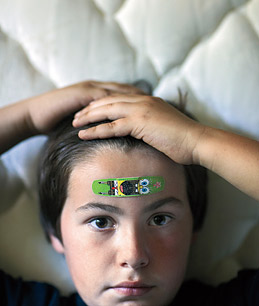
(4 of 4)
This means that not only is a child's defiant, depressive or anxious behavior explored but so are the circumstances that trigger episodes. Parents with volatile or poorly regulated moods cannot fairly expect better from their kids; the same may be true for parents who despair when confronted with obstacles.
A new study published in the Archives of General Psychiatry showed that family therapy can even help when teens suffer from eating disorders, with parents helping encourage healthy dietary habits and changing behaviors of their own that lead to dysfunction in the home. Among anorexics who successfully completed family treatment, 49% maintained weight gains after 12 months, compared with 23% of kids who underwent solo therapy. "When parents are part of therapy, they've typically served in more of a coaching role for the kids," says Creed. "But it seems more effective if the parents are also learning and practicing cognitive-behavioral skills themselves."
A wild card whenever children are being treated is the question of medication. A child's brain is a work in progress, and introducing outside chemistry could, many fear, alter its development in untold ways. In some cases, the drug question is easy to answer and is governed by the severity of the sickness. Schizophrenia is well-nigh impossible to treat without drugs, though the disease is not common in childhood. Bipolar disorder, similarly, typically calls for meds as part of the mix. The problem is, bipolar medications, which include mood stabilizers, antipsychotics and anticonvulsants, can be brutal on the body, causing weight gain and motor-control disorders and contributing to high triglycerides and diabetes.
"It's been our clinical experience that kids are more sensitive to these things," says Axelson. "On the positive end, the drugs often work relatively well and can be lifesavers." In some cases, Axelson says, bipolar kids and adults can come off drugs, at least for a while, provided the weaning takes place under a doctor's supervision. "That doesn't mean they don't have bipolar anymore," he cautions. "It's possible the disease just goes into remission for a time."
For other anxiety, mood or behavioral disorders, doctors are nearly unanimous in their opinion that it's best to try nonchemical interventions first and see if drugs are needed to fill the gaps. "First you provide support," says Vitiello, whose branch of the NIMH specializes in evaluating the efficacy and safety of treatments for kids. "If that's not sufficient, you consider drugs."
But consider carefully. Antidepressants like Paxil have come under fire as studies found that they can lead to an increase in suicidal thoughts — particularly among patients 25 or under. In 2004 the FDA ordered that all such meds carry black-box warnings disclosing this risk. Experts, including Vitiello, however, stress that antidepressants also have a protective effect and may actually prevent some people from committing suicide. The key is balancing the risks of medicating with those of not medicating — a complex calculus that patients, parents and doctors need to conduct with care and exactness.
Into the Breach
With kids' lives and welfare on the line, most parents would welcome all the help they can get, and increasingly it's available from independent, academic and government groups. For example, Roger Weissberg, a professor of psychology and education of the University of Illinois at Chicago, leads a program called the Collaborative for Academic, Social and Emotional Learning (CASEL), which advocates for school programs that teach relationship skills, self-management and other basic abilities that undergird mental health. CASEL also rates 80 nationwide, often commercial programs that offer schools seminars and course materials.
Psychologist Mark Greenberg at Penn State University has similarly launched the PATHS (Promoting Alternative Thinking Strategies) Curriculum. Yet another program, called New Beginnings, headed by psychologist Irwin Sandler of Arizona State University, offers specialized programs of six to 12 sessions for families in which parents are getting divorced or a parent has died. Familial crises such as these can usher in a powder-keg period for kids' emotional health.
"We've followed up families six years after they went through the program and, in cases of divorce, found a 36% reduction in the likelihood of diagnosed mental illness among kids," says Sandler. "We've also seen lower rates of alcohol and drug use and high-risk sex."
Ultimately, no amount of pre-emptive attention can ensure that a child will never come down with a mental illness, just as no amount of bundling up or eating right will ever provide absolute protection against colds or other physical ailments. What prevention, treatment and therapy can do is reduce the risk and, if you are unlucky and get sick anyway, improve the odds of getting well. Kids have a lifetime of experiences ahead of them. It's a healthy mind — the repository of the puzzles and charms and giddy riddles that make children such a joy — that can help them make the most of that time.